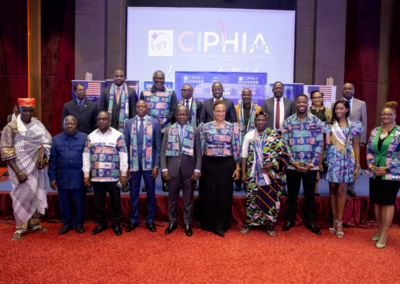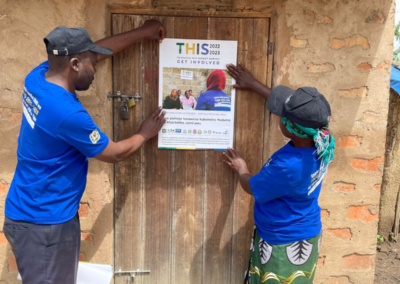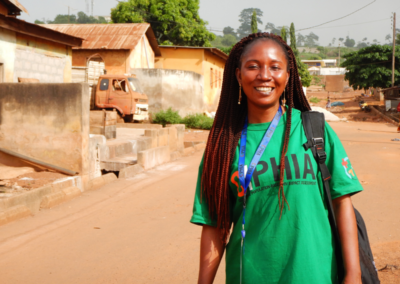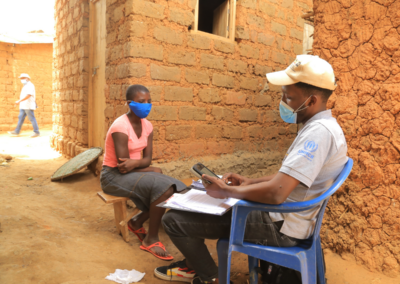
RUPHIA20.21 team listing households, during outreach in Nakivale refugee settlement camp in Uganda
Maria Uwambajimana stands in front of her house patiently waiting for a blood sample to be taken by a team from the Ministry of Health under the newly launched Uganda Refugee Population-based HIV Impact Assessment survey (RUPHIA 2021). Uwambajimana is one of the 1.2 million refugees hosted in Uganda, the third-largest refugee population in the world and the largest in Africa. This is the first time she has been tested for HIV during the 15 years she has lived in Nakivale refugee settlement, located in western Uganda.

One of the RUPHIA 2021 field lab set-ups
RUPHIA 2021 is a population-based survey that offers household-based HIV counselling and testing for refugees like Uwambajimana. Aiming to reach over 12,000 refugee households in Uganda, the survey seeks to estimate HIV prevalence of people aged 15 years and above, prevalence of viral load suppression (VLS) among HIV-positive individuals, and collect information on uptake of and access to HIV-related services. RUPHIA 2021 also estimates the prevalence of selected behaviors typically associated with HIV infection, transmission, common HIV co-morbidities and other health conditions within the refugee population in Uganda. Additionally, the survey will generate information to supplement data collected in the nationwide Uganda Population-based HIV Impact Assessment Survey (UPHIA 2020).
Speaking at the launch of RUPHIA 2021 on October 22, 2021, the Ministry of Health’s Director General of Health Services, Dr. Henry Mwebesa, said, “Despite Uganda’s pioneering refugee resettlement policies, many refugees and host community members still face challenges accessing basic services, among which include HIV-related services,” He added that, “the survey will provide us with up-to-date data on HIV burden and other health performance indicators hence informing our future planning among refugee settlement communities.”
Lisa Nelson, country director for the United States Centers for Disease Control and Prevention (CDC), noted that, “Uganda’s approach to refugee hosting has been repeatedly praised as an example of progressive refugee response policies.” She added that allowing refugees to own land and businesses and to socially integrate with the wider community makes their access to social services crucial. RUPHIA 2021 is one of the many strategies used to extend services to these communities, including HIV response in the country.

RUPHIA 2021 team member taking temperature of a participant
RUPHIA 2021 is funded by the funded by the U.S. President’s Emergency Plan for AIDS Relief (PEPFAR) through the U.S. Centers for Disease Control and Prevention (CDC). RUPHIA 2021 is spearheaded by the Ugandan Ministry of Health with support from the UN High Commissioner for Refugees (UNHCR), Uganda Bureau of Statistics (UBOS), Uganda Virus Research Institute (UVRI), the Office of the Prime Minister (OPM), the Ministry of Health (MoH), the Centers for Disease Control and Prevention (CDC), ICAP at Columbia University, and Westat. UBOS, MoH, UVRI, CDC, and ICAP staff have worked closely with the national stakeholders during the conception and development of this survey.
ICAP in Uganda country director, Dr. Sam Biraro, MBChB, PhD, emphasized the exceptional commitment of the team to deliver the survey’s findings early next year. “I am very confident that RUPHIA will provide the much-needed information to guide HIV response amongst our brothers and sisters in these settlements and I call upon everybody’s support,” he said.










